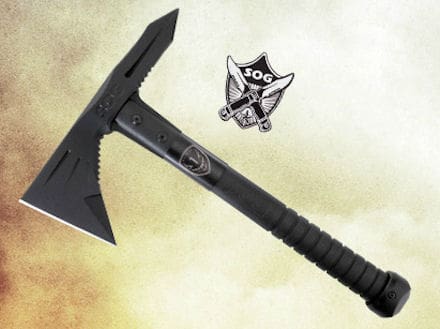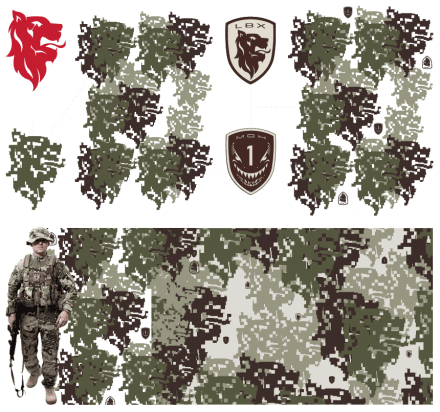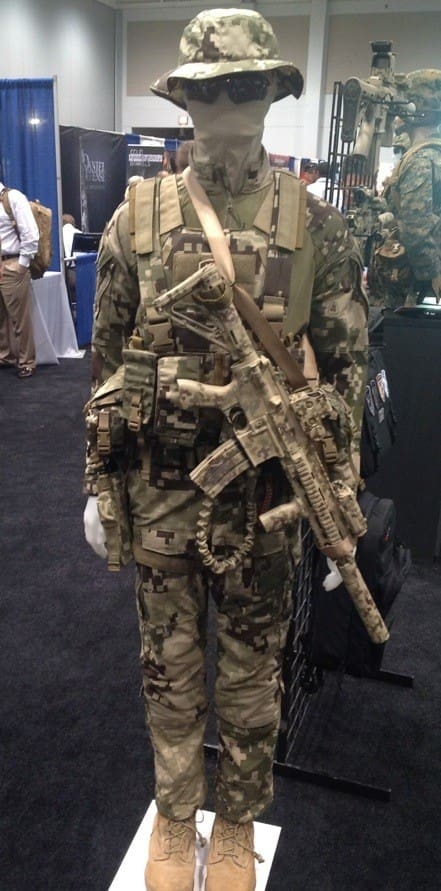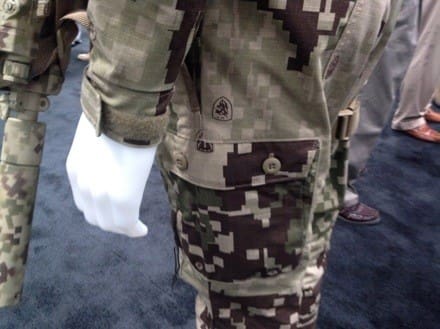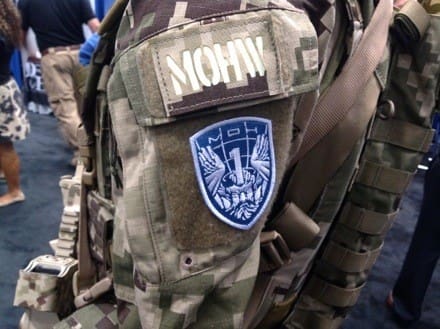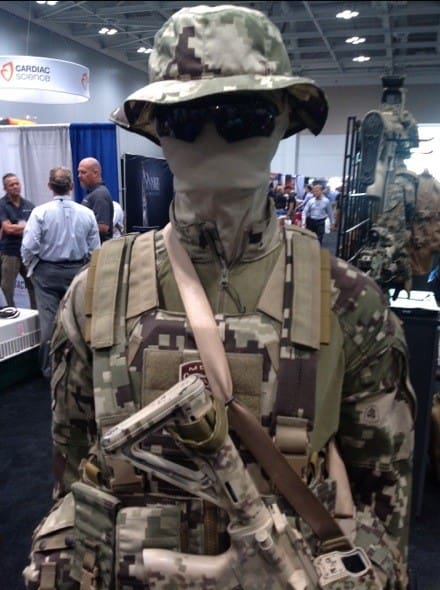Much to our chagrin, late last week, game producer Electronic Arts caved to pressure from European bloggers regarding their tie-ins to real world companies that produce tactical gear and weapons. The assertions were asinine, especially coming from someone who writes about the gaming industry. In his editorial Author Tom Bramwell dumps all over his own industry as he shows how little he understands America or the freedoms we fought so hard for. He, very hypocritically, also sets the stage for making the case that violent video games lead to real world violence. Nothing like cutting off your nose to spite your face. Obviously, Tom Bramwell is a douchebag.
Nothing had ever been accomplished like EA had made happen, at least on this scale and we here at SSD were very impressed with what we saw going on. Not only was EA emphasizing accuracy, but also working with companies we know to produce licensed products. One of our friends discussed this phenomenon with us last week and asked us how we felt that this would go over with gaming fans. We responded that it might have a different effect and might actually raise interest in gaming from the opposite side, real world users. We know it had happened on our end that way.
Unfortunately, EA’s reaction to the issue resulted in a limited edition, licensed product would not be produced. The proceeds of the sale of this SOG Knives tomahawk were to go to Project Honor, which benefits the Special Operations Warrior Foundation and the Navy SEAL Foundation. How sad that the European market was allowed to sway opinion so drastically that a charity is affected.
Another SSD friend, Jon Chang works in the gaming industry and offered up his perspective on the issue.
Over the past week, the folks at EA made a call to remove some relationships between the new Medal of Honor game and some companies in the defense industry. They made this call in response to a few opinion pieces, including one at Eurogamer.net.
“If we want the vicarious thrills of violent video games to remain morally justifiable,” whoah, stop right there. This is entertainment, or from where I stand, someone’s art. Art can mean a lot of things to a lot of different people. The notion that any depiction of violence (or potentially sex) requires some kind of moral justification is – at best – frightening. The suggestion that art of any type needs to be morally justifable is a huge grey area; a grey area that takes choice away from the individual in the name of “morals”.
During an test screening of David Fincher’s film “Se7en”, two audience members were overheard saying, “The people who made that movie should be killed.” These audience members clearly didn’t think the film was “moral” or “artistic”, yet it’s one of the most powerful films I’ve ever seen and I am a better person for having seen it. So forgive me, but I don’t need someone else to tell me what is “morally justifiable” in art and what is not. Thanks anyway.
The next gripe was regarding companion products to the game: “I want to draw attention to the fact they mean things like real gun attachments and tomahawks.”
The author goes on to quote Ryan Smith: “EA’s willingness to make a connection between a video game gun and an actual firearm is the strongest evidence yet that we’ve already let the wall crumble too much.”
Honestly, my first reaction to this: should the guns in games have fake names and lurid colors, like toy guns? If he is suggesting that having authentic looking weapons that bear the same names and are configured using the same components as real world weapons is going to lead to certain children becoming interested in the real world analog, welcome to the dawn of story telling.
Fiction, be it games, books or movies, are a form of wish-fulfillment and fantasy. Plenty of people go out and buy merch for games and movies. Others see or read about a character wearing a piece of clothing they like, driving a car that looks cool or a gun that “looks cool” and they will seek it out. People do the same thing with headlines, be it a special operations warfighter in a the news or a movie star pulling up to a red carpet event. Is there really a problem identifying those items by their real names?
The notion that branded versions of items will somehow inspire and drive users to violence is as ridiculous as the claims that listening to a Black Sabbath or Judas Priest song will send someone on a murderous rampage. If this is the case, where is the outrage for the officially licensed swords and daggers from Lord of the Rings books, movies and games? “Pitchforks and torches! To New Zealand, fellow zealots! It’s time to make a stand against the evil that is Peter Jackson!”
With about thirty seconds and Google I was able to find fully functional replica blades from D&D, Devil May Cry, Heavy Metal, Halo, Harry Potter and GI Joe. Most were fully licensed. Those that weren’t still carried the moniker. Are the officially licensed blades somehow more likely to inspire murder in the hearts of fans because they are official issue?
I’ve been down this road so many times in my life. Dungeons & Dragons will make me worship the devil and kill my parents. Heavy metal is turning people into devil worshippers and murderers. The Adventures of Tom Sawyer is not appropriate to be read and should be removed from our libraries. Comic books aren’t literature and will destroy the moral compass of people who read them. I could go on.
What’s most disappointing in this instance is that creators and, worse, gamer pundits, have taken the position that video games are creating a generation of potential killing machines. What happened to personal responsibility or parenting? I trust people to separate fantasy from reality. I trust people to engage with my art and make decisions about what they experience. Call me crazy.
If a creator gives their audience a short cut and offers a collectors/branded version of something (car, jacket, flashlight, pocket knife, ax, whatever) to drive some additional budget to make their art, it’s not anything new (what’s the last movie you saw without any product placement?). What is new, is when a company offers those items and then donates all the profits to a charity for men, women and families that have suffered unbearable losses. Who have had things taken from them that can never be returned.
Pundit Bramwell sees this as, “a video game about war, and it helps pay for the families of people who died in wars to have a slightly better standard of life. Obviously it’s all phrased in the most nauseatingly mawkish language imaginable, but anyone who has ever listened to a politician refer to his or her armed forces is used to that, and the unique way America regards and salutes its military institutions wherever possible is one cultural signifier that is at least transparent to most of the rest of the world.” It’s really hard for me not to take this personally, but I will try.
Like Danger Close, the shop I work at makes games and graphic novels set in near-future/modern conflicts in recognizable settings based on real events. I’ve developed close relations with many people who have spent years overseas at war, away from their families, and by extension we work with the companies that support them. Not all of those “consultants” are still alive. After three years, I still can’t bring myself to take their names off my contact list, because I want to see their names at unexpected times. They were amazing people and I never want to forget them.
So giving back, as Danger Close and their partners chose to do, is a personal thing for many of us. Not a cynical marketing line.
On an emotional level, I’d love for these pundits to actually sit down and meet with some of the kids who never get to see their parents again or the guys who are covered with scars on what’s left of their bodies, and tell them why it was their moral duty to push EA to terminate an entire charitable program that would maybe help pay for physical therapy or perhaps a college education. But pundits never do that. Pundits are about making headlines and selling advertising.
I will conclude by saying this: freedom and personal choice are something I deeply believe in. If the writers were so offended by a tomahawk or a branded MoH flashlight(because that’s really what we’re talking about here in terms of branded product) being released, then it’s certainly their right to write about it, but it’s frightening to me when any creator is forced to bow before mobthink. EA made a call. I don’t agree with it, but I have that luxury.
It’s a struggle to get up every day and try to make something great. I am fortunate enough to work with very talented people to create content. Some people even like what we make. We trust our audiences to be able to think, feel and make decisions about our work. I hope other creators will continue to do the same.
Jon Chang
jchang@echelon-software.com
Creator : Black Powder \\ Red Earth
President : Echelon Software


